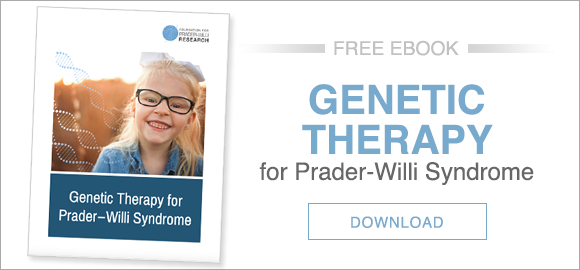Gene therapies for PWS have the potential to provide transformative treatments but much is still unknown in regards to the feasibility of a successful treatment. In this 53-minute video, Drs. Stormy Chamberlain and Jim Resnick give a brief overview of PWS genetics, describe the current landscape of PWS genetic therapy, and discuss the feasibility of this therapy. This is followed by questions from the audience. Click below to watch the video. If you're short on time, scroll down for time stamps to find the portions you're most interested in.
Presentation Summary With Timestamps
1:56 Every person with PWS has a copy of chromosome 15 that is intact (that came from mom).
- All genetic subtypes of PWS have the PWS region genes present but silenced
3:00 Genetic Approaches for PWS:
- Gene ‘replacement’ seeks to add active PWS genes to cells
- Gene activation seeks to ‘turn on’ the PWS genes tha are present, but silenced
3:39 PWS Genetics – its Complicated!
- Unlike other disorders caused by a single gene or protein, in PWS we have a lot going on!
4:20 Feasibility Questions for Genetic Therapy of PWS (list is in presentation)
6:15 Takeaways from Genetic Therapy Meeting
- There has been promising first steps that have shown encouraging potential for PWS
- Excellent resources are being developed to help answer our feasibility questions
- There are additional resources needed
- We need to start with the end game in mind – what are we looking for when we turn the genes on?
8:04 Stormy Chamberlain, University of Connecticut
- Researches PWS, Angelman and Dupe15 using iPS cells
- Develops iPS cells that can also be shared with other researchers and labs
- Looks mainly at neurons to look at gene regulation
- Trying to understand why mom’s copy gets silenced and how to turn it on
14:08 Jim Resnick, University of Florida
- Developing a mouse model to assess gene therapy in PWS
- PWS may be a good candidate for gene therapy – everyone has a perfectly good copy of the maternally inherited chromosome that is just not working – if we can activate these genes, there may be therapeutic value
- In development, certain things have to happen at certain times – what will happen if you put the genes back too late? Will it still be helpful?
- SNORD116 gene deletions – have many of the same traits as PWS. Suggests this one gene is very important. Dr. Resnick is looking to re-establish SNORD116 in a mouse model and then determine WHEN this needs to happen in order to see benefit.
24:25 Begins Q&A with the Audience








